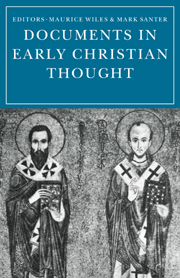9 - CHRISTIAN LIVING
Published online by Cambridge University Press: 17 August 2009
Summary
From earliest times Christians reflected on the implications of their faith for their day-to-day lives. But Clement of Alexandria was the first Christian writer to give any extended attention to questions of ethics. His work The Rich Man's Salvation is interesting not only for its treatment of a perennial dilemma – that is, whether the imperatives of the gospel are to be taken in an absolute sense or not – but also for its evidence that by the beginning of the third century there were enough prosperous Christians to call for discussion of the particular injunction to sell all.
Hippolytus of Rome, a younger contemporary of Clement, gives us a picture of what was expected of the piety of the ordinary Christian of his time – though it can be questioned how far his words are prescription rather than description. Cyprian reveals the deeply Jewish character of the piety of the African church of this period: almsgiving is a good work which atones for sin.
The passages from Basil and Chrysostom, both from the latter half of the fourth century, come from a different world. Basil is prescribing the regime for a solitary, Chrysostom for the education of a young gentleman. Both writers are self-consciously Christian, yet both are much more deeply imbued than they realize with the educational and cultural heritage of the classical world.
- Type
- Chapter
- Information
- Documents in Early Christian Thought , pp. 202 - 223Publisher: Cambridge University PressPrint publication year: 1975



